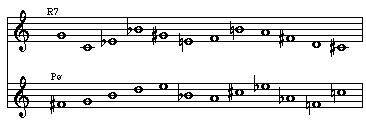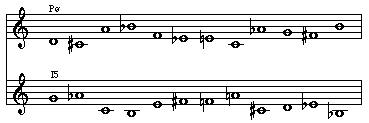C
C
E
F
A
G
E
D
F
G
B
B
D
B
A
TERMS AND PROBLEMS
1. Terms
| row (twelve-tone row) | series |
| set | prime |
| inversion | retrograde |
| retrograde inversion | reference pitch |
| twelve-tone matrix | twelve-by-twelve array |
| magic square | atonal |
| tonal cell | all-interval set |
| set type | symmetrical set |
| derived set |
2. Self-help Problems
Problem 1: On the general use of a twelve-tone matrix.
| 1. Form of the set in the first row of the grid? | _______________ | ||||||||||||
| 2. Form of the set in the first column of the grid? | _______________ | ||||||||||||
| 3. What form of the set will you see if you read | |||||||||||||
| - from left to right? | _______________ | ||||||||||||
| - from right to left? | _______________ | ||||||||||||
| - from top to bottom? | _______________ | ||||||||||||
| - from bottom to top? | _______________ |
|
Problem 2: Using pitch class number, what is the formula to determine the pitch class number for any square of the grid? Each row of the grid contains a ______________ of the prime set. The
reference pitch of both the prime and retrograde forms of a set is
located in the _____________ _____________ of the grid. The reference
pitch of both the inversion and retrograde-inversion forms of a set is
located in the _____________ _____________ of the grid. A twelve-tone
set is a _________________ collection of all twelve ___________
_____________. A twelve-tone aggregate is a __________________
|
Problem 3: Complete a twelve-tone matrix based on Schoenberg's Op. 41 set. Write the pitch class names and numbers as per the first row of the grid.
|
0 C |
11 C |
3 E |
4 F |
8 A |
7 G |
2 E |
1 D |
5 F |
6 G |
10 B |
9 B |
|
1 D |
|
|
|
|
|
|
|
|
|
|
|
|
9 B |
|
|
|
|
|
|
|
|
|
|
|
|
8 A |
|
|
|
|
|
|
|
|
|
|
|
|
|
|
|
|
|
|
|
|
|
|
|
|
|
|
|
|
|
|
|
|
|
|
|
|
|
|
|
|
|
|
|
|
|
|
|
|
|
|
|
|
|
|
|
|
|
|
|
|
|
|
|
|
|
|
|
|
|
|
|
|
|
|
|
|
|
|
|
|
|
|
|
|
|
|
|
|
|
|
|
|
|
|
|
|
|
|
|
|
|
|
|
|
|
|
|
Solution 1:
|
|
|
|
|
|
|
|
|
|
|
1. Form of the set in the first row of the grid? | Prime at 0 | |
| 2. Form of the set in the first column of the grid? | Inversion at 0 | ||||||||||||
| 3. What form of the set will you see if you read | |||||||||||||
| - from left to right? | Prime* | ||||||||||||
| - from right to left? | Retrograde* | ||||||||||||
| - from top to bottom? | Inversion* | ||||||||||||
| - from bottom to top? |
Retro.-Inversion* |
*at some transposition
|
Solution 2:
Add the PC number at the beginning of the row to the PC number at the top of the column to get the PC number in a particular cell of the grid. This is MOD12 so subtract 12 from any integer greater than 11. |
Solution 3: (add the reference PC number to PC number in Prime–or subtract its inverse (12-PC#)
|
0 C |
11 C |
3 E |
4 F |
8 A |
7 G |
2 E |
1 D |
5 F |
6 G |
10 B |
9 B |
|
1 D |
0 C |
4 F |
5 F |
9 B |
8 A |
3 E |
2 E |
6 G |
7 G |
11 C |
10 B |
|
9 B |
8 A |
0 C |
1 D |
5 F |
4 F |
11 C |
10 B |
2 E |
3 E |
7 G |
6 G |
|
8 A |
7 G |
11 C |
0 C |
4 F |
3 E |
10 B |
9 B |
1 D |
2 E |
6 G |
5 F |
|
4 F |
3 E |
7 G |
8 A |
0 C |
11 C |
6 G |
5 F |
9 B |
10 B |
2 E |
1 D |
|
5 F |
4 F |
8 A |
9 B |
1 D |
0 C |
7 G |
6 G |
10 B |
11 C |
3 E |
2 E |
|
10 B |
9 B |
1 D |
2 E |
6 G |
5 F |
0 C |
11 C |
3 E |
4 F |
8 A |
7 G |
|
11 C |
10 B |
2 E |
3 E |
7 G |
6 G |
1 D |
0 C |
4 F |
5 F |
9 B |
8 A |
|
7 G |
6 G |
10 B |
11 C |
3 E |
2 E |
9 B |
8 A |
0 C |
1 D |
5 F |
4 F |
|
6 G |
5 F |
9 B |
10 B |
2 E |
1 D |
8 A |
7 G |
11 C |
0 C |
4 F |
3 E |
|
2 E |
1 D |
5 F |
6 G |
10 B |
9 B |
4 F |
3 E |
7 G |
8 A |
0 C |
11 C |
|
3 E |
2 E |
6 G |
7 G |
11 C |
10 B |
5 F |
4 F |
8 A |
9 B |
1 D |
0 C |
Problem 4: Canti di liberazioni No. 2 Dallapiccola
Assume that this is the R7 form of the set. Write the PØ form in the second staff. Remember, the reference pitch is the last note of all R and RI forms of a set.

Problem 5: Three Songs, Op. 25 Webern
Assume this is the PØ form of the set. Write the RI2 form of the set in the second staff. Remember, the reference pitch is the last note of all R and RI forms of a set.

Problem 6: Quartet 4, Op. 37 Schoenberg
Assume that this is the PØ form of the set. Write the I5 form of the set in the second staff.

Solution 4: Canti di liberazioni No. 2 Dallapiccola

Solution 5: Webern: Three Songs, Op. 25

Solution 6: Schoenberg: Quartet 4, Op. 37

Go to Twelve Tone Composition, Part 2